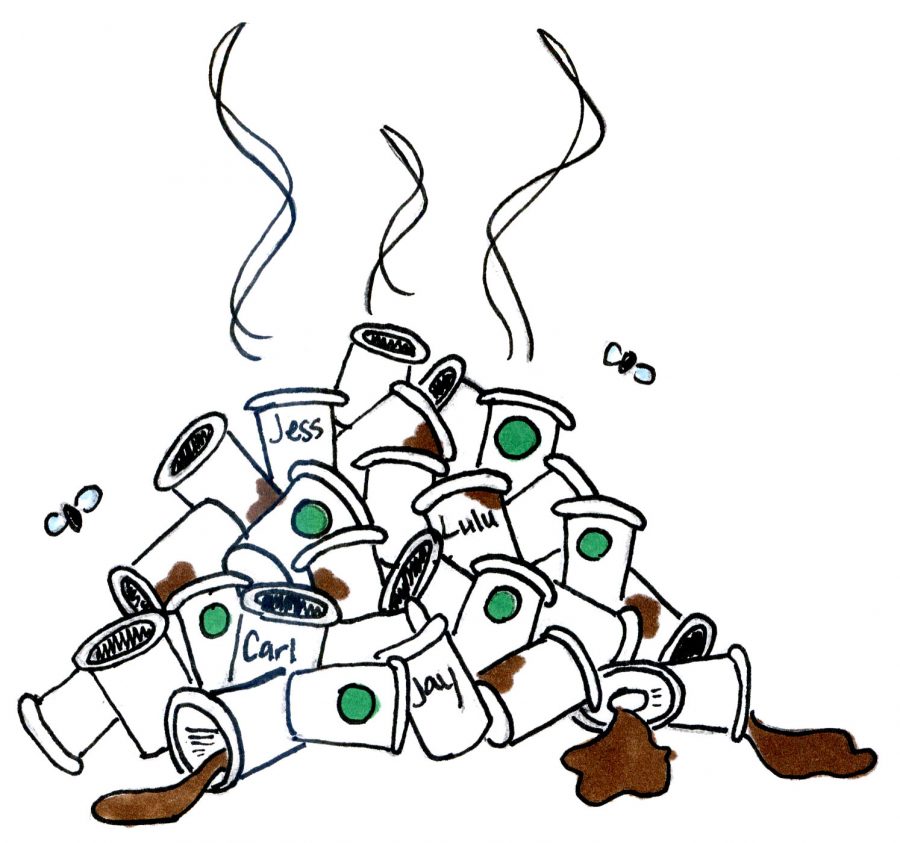Students often lead chaotic lives, and in the midst of the mayhem, it’s not uncommon to grab a coffee or bite to eat at one of the fast food restaurants on campus. But while convenience may rule in the moment, food and drinks to-go is especially wasteful.
We’ve all seen the horrendous pictures of floating plastic in the Pacific Ocean, an immediately recognizable result of the issue at stake. According to the Environmental Protection Agency, 45 percent of our landfills are composed of food, packaging and containers. Plastic lids, straws and containers end up in a landfill, yet they’re often not even necessary in the first place. Nevertheless, there are steps students can and should take to minimize trash. Campus restaurants are a great place to start.
Perhaps one of the easiest and most convenient ways for students to minimize their waste is to be cognizant of where they buy their coffee from. It’s rare to see a Starbucks on campus that doesn’t have an excessively long line, and while it’s generally a responsible and ethical corporation, switching out your morning Starbucks with a coffee from Texas Coffee Traders (TCT) keeps consumption as green as possible.
TCT uses sustainable cups made by ECO Products, a company devoted to using less oil in the production of their cups. Furthermore, they’re compostable and made with 24 percent post-consumer recycled fiber cups, whereas Starbucks uses cups that are 10 percent post-consumer recycled fiber. Both spots encourage green behavior and use of personal tumblers, but for those who make their way to campus without their own cup, there’s a responsible choice to make.
Moreover, TCT doesn’t immediately give you a lid when they hand you your coffee. There’s a station off to the side where students can grab one if they like, but for those who are simply taking their coffee to a nearby table, it’s an unnecessary addition. Lids are useful when walking across campus with a full cup. But if you’re simply sitting at a table, the coffee probably won’t spill. Nevertheless if you decide a lid is necessary, TCT still uses unusually earth-friendly lids.
In addition to coffee, the fast food industry is notorious for being one of the greatest producers of waste, but simple steps can decrease its harm. The Student Activity Center’s Taco Cabana is a prime example.
While it’s certainly convenient to pack your salsas of choice into the available small plastic containers while waiting for your order, those are especially harmful to the environment. Putting condiments directly on the tacos rather than in plastic containers is incredibly easy. There’s not a valid excuse for the excessive contribution to landfills. Small steps can help change that.
Whether they’re grabbing the weekday morning Taco Cabana or pick-me-up coffee, students should make a greater effort to reduce their waste. Campus food and drinks are just one place to start — there are endless opportunities to be a more ethical consumer. Even just one good habit can make a difference.
Vernon is an anthropology and rhetoric and writing junior from The Woodlands. She is a senior columnist.


















